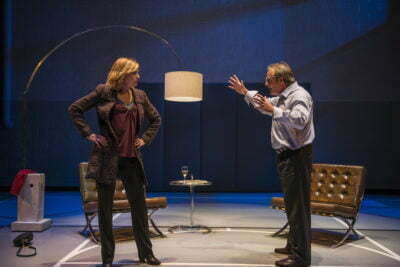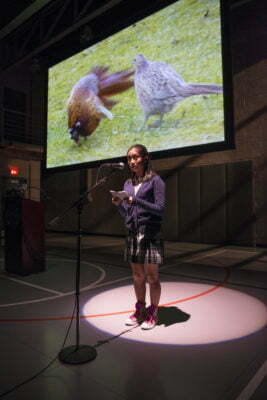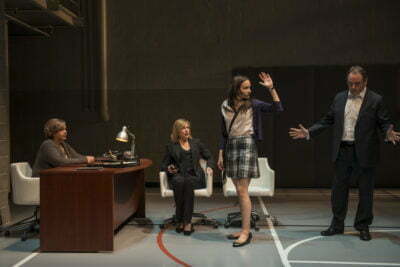Domesticated
 Written and Directed by Bruce Norris
Written and Directed by Bruce Norris
Produced by Steppenwolf Theatre Company
Norris Returns to His Old Stomping Grounds
People familiar with the works of Bruce Norris, and people who regularly attend Steppenwolf undoubtedly are, may remember his 2000 play The Infidel. Inspired by the downfall of New York Chief Justice Sol Wachtler, The Infidel centered on Harvey Garvey, a mentally ill former state Supreme Court judge who was imprisoned for stalking and threatening a woman he had an affair with, and the testimony from his wife and an opposing lawyer regarding whether he should be released. The judge’s sympathetic, but condescending wife declares that men lack emotional resilience, and when under pressure, surrender to “the infidel” besieging their minds. In his 2013 drama Domesticated, premiering in Chicago under the direction of the author himself, Norris returns to the same territory, but this time, with less sympathy for all sides. As always, Norris’s sense of humor is as cruel as his wit, and though there’s little that can shock modern audiences, his insistence on voicing the darkest repressed thoughts in the upper-middle class liberal psyche continues to provoke emotional responses and debate.

Domesticated begins with one of the universally despised rituals of contemporary politics: the press conference to announce a resignation over infidelity. Exactly what position Bill Pulver (Tom Irwin) held is never explained, but he interrupts his own apology multiple times to point out how inane the whole thing is, and from the look on the face of his wife, Judy (Mary Beth Fisher), she agrees. Later, at dinner, Bill and Judy’s teenage daughter, Casey (Melanie Neilan), is going on a typically Norris rant about the contradictoriness of liberals denouncing female genital mutilation while promoting policies of non-intervention and multiculturalism, when Bill breaks down in tears. However, Judy remains unimpressed. Bill’s misdeed was that while meeting with a twenty-three year old prostitute who he had dressed up in a schoolgirl uniform similar to Casey’s, the woman either fell accidently or he pushed her, and she has suffered severe brain damage. The Pulvers’ longtime friend Bobbie (Beth Lacke) is serving as their lawyer during litigation, but a hefty settlement takes a steep toll on the family finances.

Act I of Domesticated focuses on Judy. She admits that when she met Bill in college, she was having an affair with a married professor, “but shouldn’t people learn lessons?” she asks. Though she initially takes some pleasure in punishing Bill, who sits in shamed silence for over a year, more and more of his betrayals are slowly revealed, until she winds up totally humiliated and questioning whether she ever understood him or anyone at all. She writes a memoir which gets enough attention to further harm Bill’s reputation, but doesn’t dig them out of their financial hole. Act II focuses on Bill, after he decides to leave his family. It begins with him delivering a long denouncement of marriage and monogamy, which he regards as purely transactional and a raw deal for men. His finances, health, and prospects continue to nosedive directly due to his inability to get along with women, many of whom seem to have it in for him. Interspersed among the scenes of his destruction are excerpts from a class project delivered by his and Judy’s younger daughter, Cassidy (Emily Chang), adopted from Cambodia (“good for you,” a talk-show host praises them). Cassidy’s project is about sexual dimorphism in animals, and her cherry-picked examples are selected to demonstrate how males of several species have worse lives than females by human standards, and ends with the bone-eating snot flower, among which males have become totally vestigial.

Bruce Norris isn’t a fan of the idea that audiences have to identify with or root for a character to enjoy a show. As far as acting goes, there are several impressive performances here, particularly Irwin and Fisher as two screwed up, vitriolic individuals. Irwin’s character is the nastier one, of course. While it is possible to interpret his monologue as an attempt to goad the bartender into proving him wrong, his description of how women use men to get pregnant, and then transfer all their love to their babies, leaving men with nothing, implies he thinks it is normal for fathers to place no value on their children. Later, Bill denies the existence of love at all, and though Norris has said he is influenced by August Strindberg, who wrote extensively about the problems of middle-class marriage, even Strindberg didn’t deny, when he was cogent, the existence of love or that women are genuinely hurt by men’s rejection. Judy suffers a lot from Bill’s actions, but reacts to him primarily with disgust. Bill is the only male character in the large ensemble made up of fourteen actors, but most of the women refuse to grant his premise that his personal dysfunction amounts to a battle of the sexes, and merely snicker at him.

Norris does not totally condemn, Bill, however. The author says, “I think that this idea—that everything that men instinctively want, on a primitive level, is basically bad and everything women want, basically good—is how we’ve constructed our present morality, based on gender. We see women as a civilizing force—the things they want lead to social stability and the things men want lead to chaos and destruction.” Actually, historians and academics who study gender have long recognized that nineteenth century Americans and Europeans built a cult around bourgeois motherhood which lingers to the present day, and provides the Christian right and radical feminists with common cause in demonizing male sexuality whenever it is not directed toward helping a spiritually purer wife achieve nirvana through tending children, or suppressed entirely. Bill lied to Judy about intending to be monogamous before they married and spent most of his year of silent penitence still attempting to deceive her about the full extent of his philandering, but everybody, including Judy, makes excuses for his female partners much more readily, and there was no clear path to redemption for him even if he were interested in pursuing one, nor does anything we see of Judy suggest she was ever affectionate.

However, I do disagree with the consensus regarding one character: the older daughter, Casey. Though her hatred for her parents, and especially a father who likely struggle with incestuous lust for her, is completely justified, a lot of people seem to think her vociferous insults go too far, and are disgusted by scenes of her acting selfishly about matters that have nothing to do with her parents. But Casey has the most laid-back and uncomplicated attitude toward sexuality out of anyone, and in one scene, which is only a small step toward decline for her parents but significant for its real-world implications, Casey sacrifices herself to protect the boys in her school from being punished for taking part in a sexting ring which she initiated. Despite sharing her contempt for idealizing sex, Bill would never do that, and he can’t imagine any woman ever would. Since Norris directed it, this production is presumably as close as is possible to what he wanted from Domesticated. The biggest challenge, how to cram all these scenes onto a stage that is more than a blackbox, he and designer Todd Rosenthal solve by setting the play on an implausibly pristine high school basketball court. Perhaps the representation of the younger generation shaking free from Victorianism is implausible as well, but Norris clearly saw some reason to return to The Infidel’s subject fifteen years later. In any case, Domesticated is as funny and grotesque as we know Norris can be.
Recommended
Jacob Davis
[email protected]
Reviewed December 12, 2015
This show has been Jeff recommended.
For more information, see Domesticated’s page on Theatre in Chicago.
Playing at Steppenwolf Downstairs Theatre, 1650 N Halsted, Chicago. Tickets are $20-89; to order, call 312-335-1650 or visit Steppenwolf.org. Playing through February 7, 2016. Running time is two hours and fifteen minutes with one intermission.
